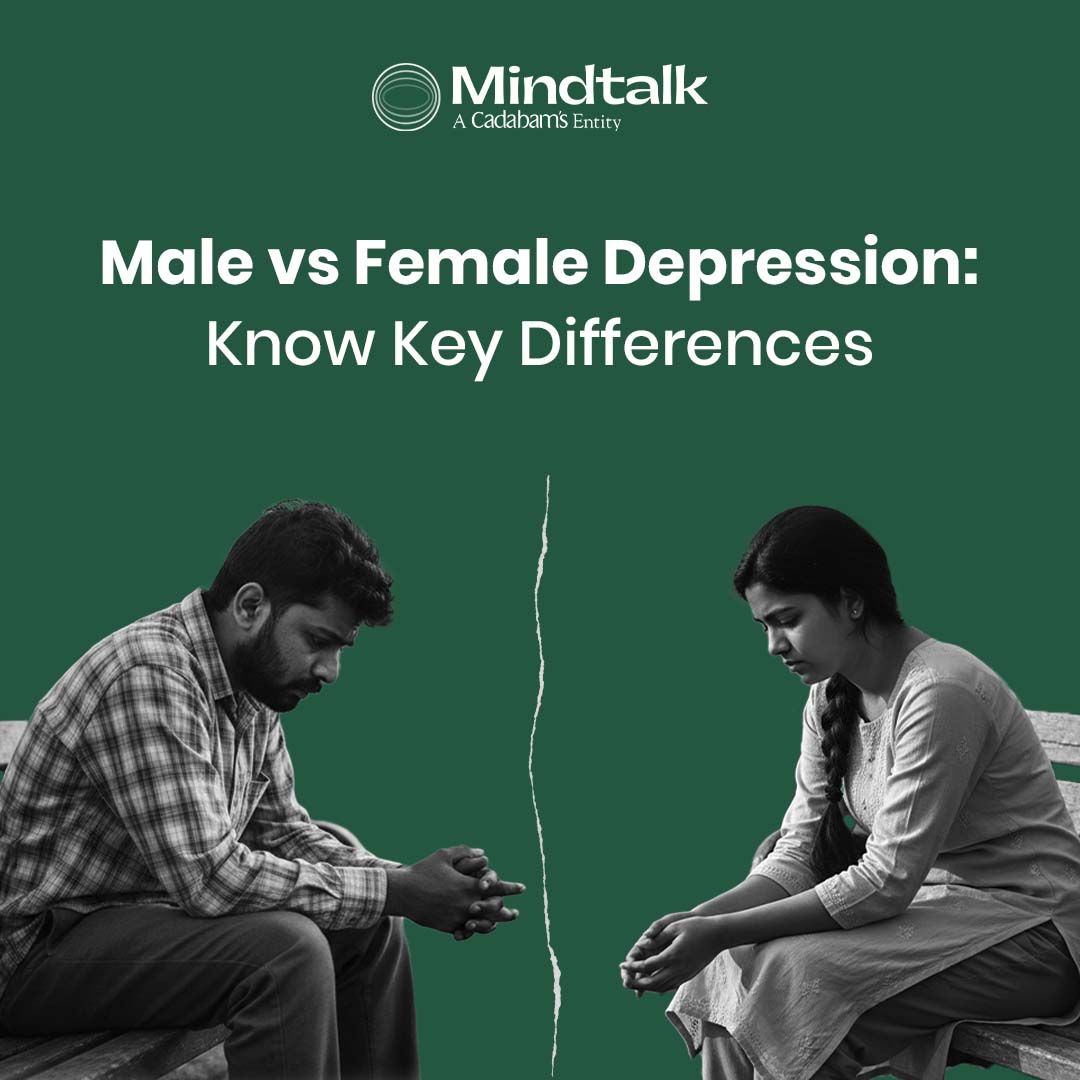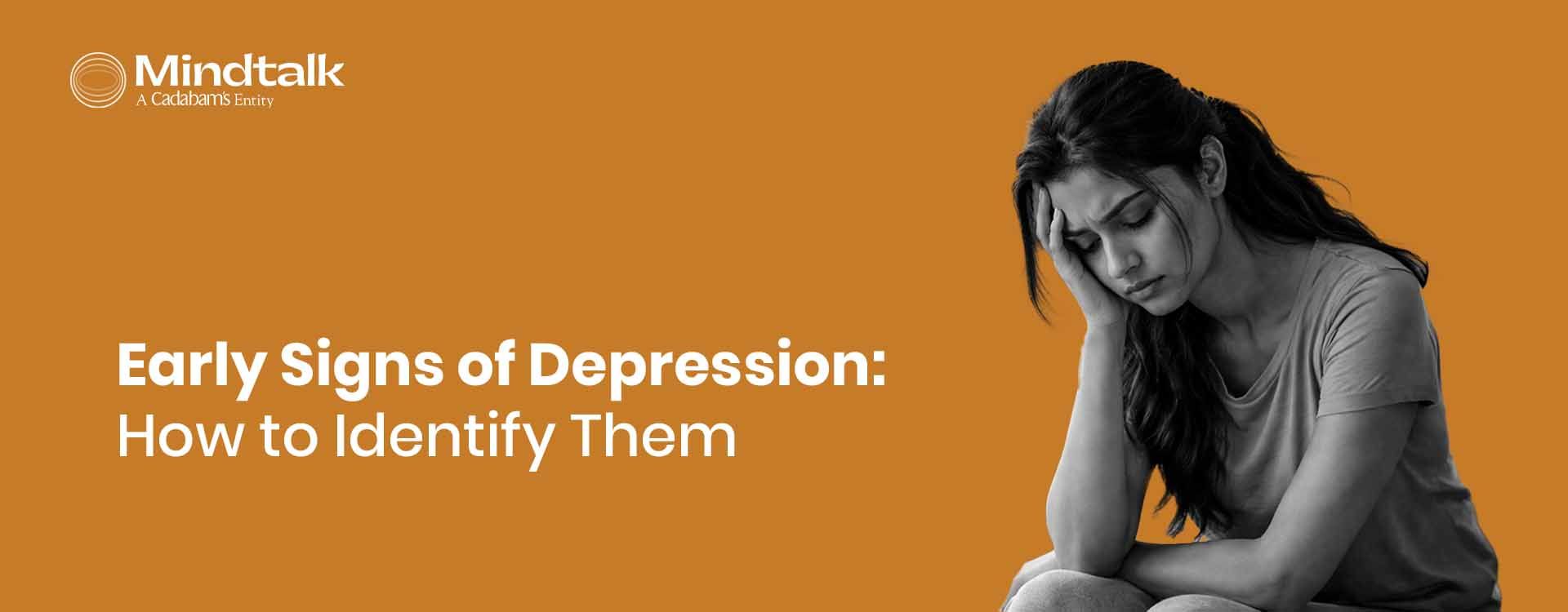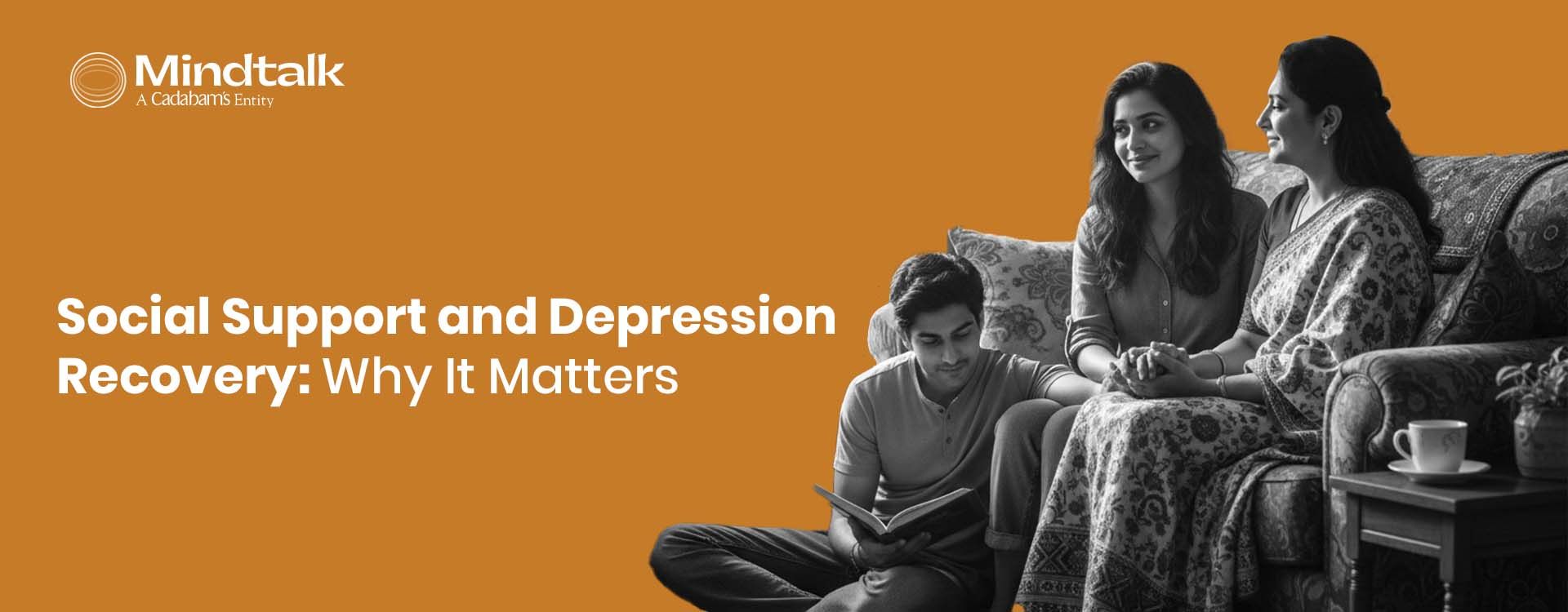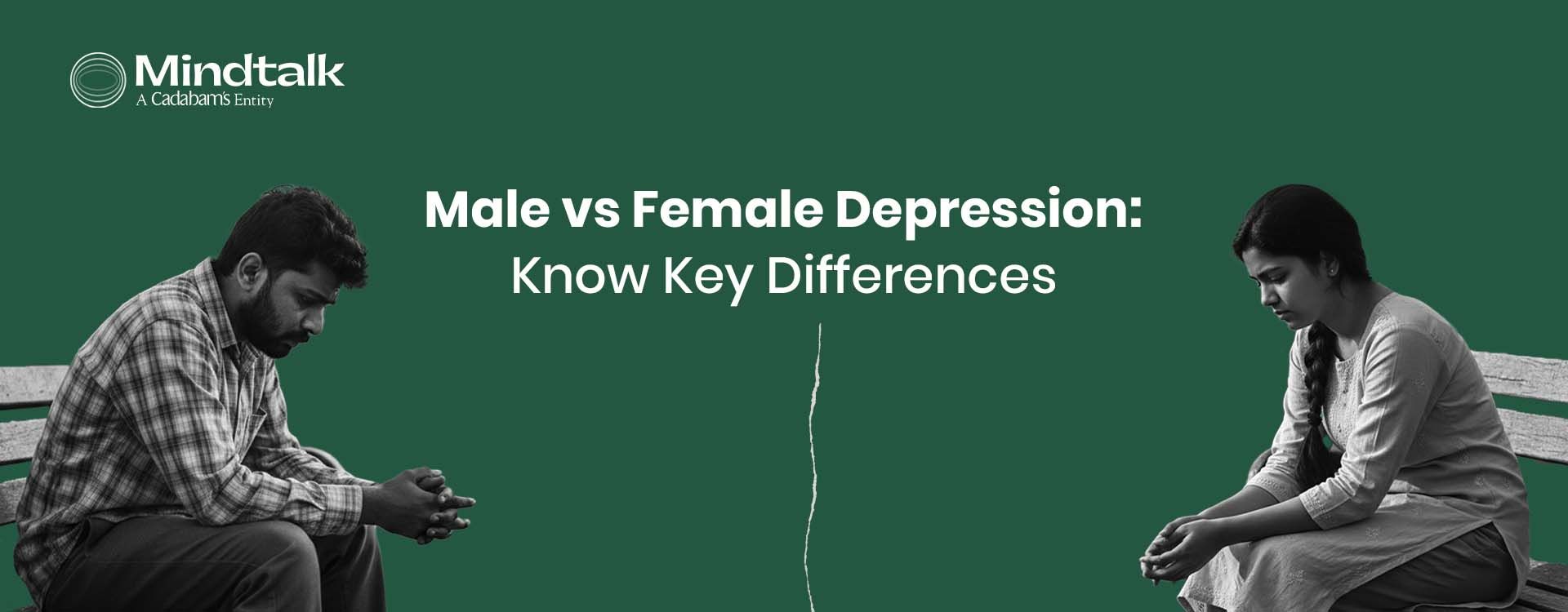Male vs Female Depression: Gender-based Differences
Depression doesn’t look the same for everyone and that includes across genders. While both men and women experience depression, studies show that women are diagnosed nearly twice as often.
But why is this the case? From hormonal shifts to emotional labour, societal roles to misdiagnosis many layers shape how depression shows up in women.

Understanding Depression Through a Gender Lens
Depression affects people of all genders, but it doesn't always look or feel the same. Biological, emotional, and social factors influence how symptoms are experienced and expressed especially in women. These differences shape everything from diagnosis to recovery.
Prevalence of Depression in Women
Women are nearly twice as likely to be diagnosed with depression as men. WHO data shows a global depression prevalence of 6% in women versus 4% in men.
According to the CDC, in 2019, 21.8% of women reported experiencing symptoms of depression, ranging from mild to severe, within a two-week period. This was notably higher than the 15.0% reported among men.
The Gender Gap: What Research Tells Us
Studies link depression in women to hormonal changes, social roles, and trauma exposure.
A 2021 Lancet Psychiatry review highlighted gender differences in the prevalence, onset, and course of depression—tracing the persistent gap to both biological and social factors.
These factors, combined with a greater tendency to seek help, may explain why more women are diagnosed while men may remain underdiagnosed.
Biological and Hormonal Influences
Hormonal changes throughout a woman’s life can directly impact mental health. Estrogen and progesterone, in particular, influence neurotransmitters tied to mood making some stages of life more emotionally vulnerable than others.
The Role of Estrogen and Progesterone
Estrogen and progesterone regulate mood-related neurotransmitters. When these hormones rise or fall especially before menstruation or after childbirth women may feel more emotionally reactive.
Even small hormonal changes can trigger sadness, fatigue, or irritability, particularly in those with a family history of mood disorders or existing mental health challenges.
Depression During PMS, Pregnancy, and Menopause
PMS often brings irritability or low mood during the luteal phase. Pregnancy involves hormonal surges that may lead to anxiety or sadness.
During menopause, dropping estrogen levels are linked to sleep issues, mood swings, and an increased risk of depression especially when combined with life stress or previous mental health concerns.
The Burden of Emotional Labour
Many women take on the invisible task of managing not just their own emotions but also those of others. At home and work, this unseen effort adds up and can quietly affect mental health over time.
What Is Emotional Labour?
Emotional labour is the unspoken responsibility of keeping things emotionally smooth for others at home, in relationships, and at work.
It includes remembering birthdays, calming tensions, and being “pleasant” even when overwhelmed. For many women, this effort goes unacknowledged, yet it drains emotional energy and adds to daily mental load.
How Caregiving and Emotional Management Lead to Burnout
Constantly managing others’ needs while pushing aside your own can lead to burnout. Women often juggle childcare, elder care, and emotional support roles without pause.
Over time, this emotional depletion can mimic or worsen depression leaving women exhausted, irritable, or feeling disconnected. Without space to recover, even minor stress can feel overwhelming.
Societal Expectations and Internalised Pressure
Women are often expected to be everything to everyone nurturing at home, driven at work, flawless in appearance. These constant messages become internalised, leading to emotional strain, low self-worth, and mental exhaustion over time.
Perfectionism and Pressure to Perform
Many women feel they must excel in all areas career, parenting, relationships, and self-care. This pressure to “have it all together” often leads to guilt, overworking, and burnout.
Even minor mistakes can feel like personal failures, reinforcing shame and anxiety. Over time, this pursuit of perfection chips away at mental well-being.
Body Image and Social Comparison
Social media and advertising often portray narrow beauty ideals: clear skin, thin body, effortless grace.
Women may compare themselves constantly, feeling “less than” when they don’t match these standards.
This comparison can lead to body dissatisfaction, low self-esteem, and disordered eating patterns all of which are closely linked to depression and anxiety.
Diagnostic Differences Between Men and Women
Depression is diagnosed based on criteria that may not reflect how symptoms appear across genders.
Variations in emotional expression, coping styles, and cultural conditioning can lead to missed, delayed, or incorrect diagnoses affecting access to timely and effective care.
Misdiagnosis and Dismissal in Women
Women’s symptoms are often misread as hormonal mood swings, stress, or even personality traits. Complaints like fatigue or pain may be seen as exaggerated or brushed off as anxiety.
This can delay accurate diagnosis and appropriate treatment. In some cases, women are prescribed medication without a proper mental health evaluation reflecting deeper biases in how emotional expression is interpreted in clinical settings.
The Intersection of Gender, Race, and Socioeconomic Status
Depression in women doesn’t occur in isolation. Social identities like race, class, and sexual orientation often overlap, amplifying stress, discrimination, and emotional strain.
These intersecting factors increase the risk of depression and reduce access to timely support.
Depression in Marginalised Women
Women of colour, LGBTQ+ women, and those from low-income backgrounds often face a compounded mental health burden.
Racism, cultural stigma, financial stress, and exclusion from healthcare systems create barriers to care and emotional safety.
These women may internalise pain quietly, go undiagnosed, or be dismissed by professionals. Without culturally responsive support, depression in these groups often remains invisible, despite its deep and lasting impact.
Barriers to Treatment for Women
Even though women are more likely to experience depression, many don’t receive timely help. Personal responsibilities, social stigma, and limited resources often stand in the way creating both seen and unseen obstacles to accessing mental health care.
Cultural and Family Expectations
In many communities, women are expected to stay strong, selfless, and emotionally resilient. Seeking help may be viewed as weakness or disloyalty to family roles.
Stigma around mental health, fear of judgement, and lack of family support often prevent women from speaking up. These expectations silence emotional pain and delay care when it’s needed most.
Effective Strategies to Improve Women’s Mental Health
Addressing depression in women means looking beyond symptoms. Early support, emotional validation, and tailored treatment approaches can make a meaningful difference especially when care is flexible, inclusive, and built around real-life needs.
When to Seek Help
Feeling persistently low, emotionally drained, or disconnected from daily life are signs that support may be needed.
Difficulty sleeping, frequent crying, loss of interest in things once enjoyed, or unexplained aches can all point to depression. If these symptoms linger for more than two weeks, it’s worth speaking to a mental health professional.
Most Beneficial Treatment Options
Cognitive Behavioural Therapy (CBT), interpersonal therapy, and medication are effective for many women. Hormonal regulation may also help during life stages like menopause or post-pregnancy.
Support groups and community-based programs provide emotional connection. Mind–body techniques like yoga or mindfulness can support stress relief. What works best is a plan that fits a woman’s unique needs and context.
How Support Systems Can Empower Recovery
Healing from depression is not just about treatment it’s about feeling supported. When women are surrounded by understanding, open, and emotionally safe relationships, recovery becomes more sustainable and less isolating.
Encouraging Conversations About Mental Health
Talking about depression openly can reduce shame and fear. Safe spaces whether in families, friendships, or workplaces, allow women to express difficult emotions without judgement.
These conversations help normalise mental health struggles, encourage early help-seeking, and make room for empathy. Sometimes, just knowing it’s okay to talk is the first step toward healing.
Peer Support and Empowerment Groups
Social connection can prevent relapse by creating a sense of belonging. Peer groups offer validation, shared understanding, and hope.
Women feel less alone when they meet others navigating similar challenges. These communities encourage openness, reinforce coping skills, and remind women that recovery isn’t a solitary path it’s strengthened by connection.
Helping Women Overcome Depression with Mindtalk
Depression in women is shaped by more than just biology, it’s influenced by emotional labour, societal pressure, and unequal access to care. Recognising these layers helps us respond with more compassion and better solutions.
Whether it’s through therapy, support groups, or simply starting a conversation, early intervention matters. You don’t have to wait until it’s overwhelming. Reaching out isn’t a weakness, it’s the first step toward feeling understood, supported, and whole again. Mindtalk is here to help.
Meet Our Depression Management Experts





